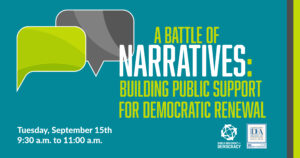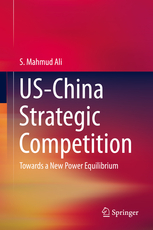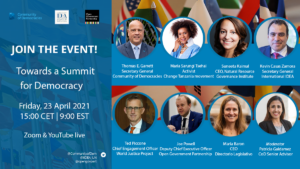 Democracy v autocracy will be one of the coming year’s ten trends to watch, according to the Economist’s 2022 preview. America’s mid-term elections and China’s Communist Party congress will vividly contrast their rival political systems. Which is better at delivering stability, growth and innovation? This rivalry will play out in everything from trade to tech regulation, vaccinations to space stations.
Democracy v autocracy will be one of the coming year’s ten trends to watch, according to the Economist’s 2022 preview. America’s mid-term elections and China’s Communist Party congress will vividly contrast their rival political systems. Which is better at delivering stability, growth and innovation? This rivalry will play out in everything from trade to tech regulation, vaccinations to space stations.
The 21st century may prove to be both an era of geopolitical competition and an age of intervulnerability, however paradoxical that may seem, in which the two dynamics feed off each other in positive and negative ways, Uri Friedman writes for The Atlantic.
President Joe Biden’s proclamation in his United Nations General Assembly address that “a fundamental truth of the 21st century” is that “our security, our prosperity, and our very freedoms are interconnected” requiring rival states to “work together as never before” were in tension with his insistence that the U.S. must join with democratic allies to tackle the countervailing forces of resurgent autocracies—the ideological dimension of strategic competition, Friedman suggests.
 On the values-based side of the foreign policy ledger, a growing number of observers insist that the real Biden Doctrine is to preserve and prove “the supremacy of democracy” worldwide, adds Anne-Marie Slaughter, C.E.O. of New America, and former director of policy planning for the U.S. Department of State. Boston University’s Joshua Shifrinson and Carnegie’s Stephen Wertheim claim that the Biden Doctrine is “pragmatic realism,” pursuing U.S. interests “in a competitive world,” she notes, while former Foreign Policy editor Jonathan Tepperman believes the “global contest between democracies and autocracies” provides an “organizing principle” to link investing in infrastructure and industrial policy at home, pursuing a foreign policy for the middle class and working to build coalitions of democracies abroad.
On the values-based side of the foreign policy ledger, a growing number of observers insist that the real Biden Doctrine is to preserve and prove “the supremacy of democracy” worldwide, adds Anne-Marie Slaughter, C.E.O. of New America, and former director of policy planning for the U.S. Department of State. Boston University’s Joshua Shifrinson and Carnegie’s Stephen Wertheim claim that the Biden Doctrine is “pragmatic realism,” pursuing U.S. interests “in a competitive world,” she notes, while former Foreign Policy editor Jonathan Tepperman believes the “global contest between democracies and autocracies” provides an “organizing principle” to link investing in infrastructure and industrial policy at home, pursuing a foreign policy for the middle class and working to build coalitions of democracies abroad.
Beyond U.S. borders, the contest between democracy and autocracy should be an open competition to see which governments can deliver more — materially, intellectually, spiritual and all the other ways we measure human flourishing — for their people, adds Slaughter, a former board member of the National Endowment for Democracy (NED). One measure might be which country does the most to achieve the U.N.’s Sustainable Development Goals, as assessed by a global coalition of civic organizations, she writes for the Times.
Autocratic powers are becoming increasingly assertive in the global battle of narratives, with vocal criticisms of ‘Western’ liberal democracy in general and the forthcoming Summit for Democracy in particular. At the same time, they lay claim to the mantle of democracy as a barely credible source of ersatz legitimacy.
A top Chinese official issued a rare criticism of the U.S. and Western democracy during a high-profile political press conference Friday, CNBC reports.
“Democracy is not an exclusive patent of Western countries and even less should it be defined or dictated by Western countries,” said Jiang Jinqua, director of the policy research office of the ruling Communist Party’s central committee. He contrasts China’s “whole-process people’s democracy” with the West’s electoral democracy.
“Vigorous Chinese democracy vs aging Western one,” runs a headline in the CCP’s Global Times, suggesting that “Chinese and Western democratic systems could learn from each other and carry out sound competition.”
 The U.S. plan to hold a “Summit for Democracy” in December is “an attempt to revitalize Western democracy,” Jiang said. “To convene such a summit against [a] backdrop of loads of problems in Western democracy, … the intention is nothing but bashing other countries and dividing the world.”
The U.S. plan to hold a “Summit for Democracy” in December is “an attempt to revitalize Western democracy,” Jiang said. “To convene such a summit against [a] backdrop of loads of problems in Western democracy, … the intention is nothing but bashing other countries and dividing the world.”
A prominent Russian diplomat today dismissed the summit’ as ‘chimerical’ while Beijing has also endorsed Russian Foreign Minister Sergei Lavrov’s recent claim that the event is “quite in the spirit of a Cold War, as it declares a new ideological crusade against all dissenters.”
The key to understanding Russian grand strategy is recognizing that the Kremlin believes values-based ideologies are the source of the most powerful weapons in the current security environment, notes analyst Ben Sohl.
 “After 1991 there was the illusion that a new national ideology, a development ideology, would simply appear by itself.” Putin told the Valdai Club, adding that “today we need new strategies to preserve our identity,” because a key focus of inter-state competition is “ideological-informational.”
“After 1991 there was the illusion that a new national ideology, a development ideology, would simply appear by itself.” Putin told the Valdai Club, adding that “today we need new strategies to preserve our identity,” because a key focus of inter-state competition is “ideological-informational.”
Moscow believes the United States starts by using information warfare to promote democracy amongst a population in a targeted state, Sohl writes for the National Interest. This value-promotion cultivates a democratic “front” within the target state by shaping a population’s value system to want democracy and then attracting them to American leadership via soft power. The co-opted front is then used to generate “controlled chaos,” such as large-scale protests, which present opportunities to overthrow the targeted regime.
But it is autocratic Russia and Belarus that are conducting “a new type of war” by weaponizing migrants, forcing Poland, Latvia and Lithuania to curb democratic liberties, the Wall Street Journal reports:
All three EU nations that neighbor Belarus have blocked journalists, activists, and nongovernmental organizations from approaching the border, with police establishing checkpoints along the roads leading to the area. Their governments have declared states of emergency in their border regions, curtailing ordinary democratic freedoms to manage what they see as a threat to their sovereignty.
 The Summit for Democracy has the potential to revitalize the fight for freedom worldwide, but only if it generates specific, concrete goals rather than bland policy statements, according to Richard Fontaine, CEO of the Center for a New American Security, and Jared Cohen, founder and CEO of Jigsaw at Alphabet Inc. and an adjunct senior fellow at the Council on Foreign Relations.
The Summit for Democracy has the potential to revitalize the fight for freedom worldwide, but only if it generates specific, concrete goals rather than bland policy statements, according to Richard Fontaine, CEO of the Center for a New American Security, and Jared Cohen, founder and CEO of Jigsaw at Alphabet Inc. and an adjunct senior fellow at the Council on Foreign Relations.
To accomplish these goals, the summit agenda should fall under three pillars, they write for Foreign Policy:
- The first is inside-out diplomacy, harnessing the strengths of one country to improve the domestic practices of others. South Korea, for example, could chair a working group on effectively holding elections amid a pandemic or other national crisis. …
- The second agenda pillar should focus on defending and extending democracy. Working groups should aim to defend democracies against external non-military threats such as hacking, disinformation, and election meddling; and to extend democratic practices in places where they are lacking, including in some of the partly free countries that will attend the summit…..
- Democratic cooperation on technology, which is central to the economic, military, ideological, and geopolitical competition between democracies and autocracies, should be the agenda’s third pillar. …. A steering group such as the T-12, which we have proposed to bring together the world’s leading techno-democracies, would fill a critical gap in existing international organizations and provide an informal mechanism for cooperation on everything from supply-chain audits to alignment on digital currency and electronic payments to standards-setting and investment.
Our paradigms mold our assumptions and expectations, and thus our policies and behavior. As the international-relations scholar Van Jackson has noted, “The way we think about the future is going to end up shaping it,” adds Friedman, the managing editor at the Atlantic Council and a contributing writer at The Atlantic:
So which is it: an era of geopolitical competition featuring a sprawling struggle between the United States and its democratic allies on the one hand and China and other authoritarian powers on the other? Or an age of intervulnerability in which all countries, despite their rivalries and clashing worldviews, band together to combat collective challenges?
@NEDemocracy board member @KelleyCurrie draws attn to latest manifestation of what @ThinkDemocracy calls Beijing’s #sharppower https://t.co/kg3dcoaJQ3
— Democracy Digest (@demdigest) November 12, 2021







